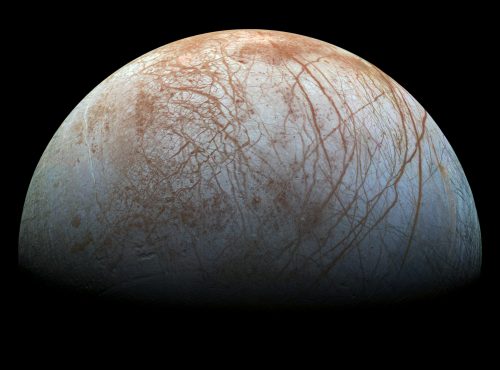We asked leading scientists to try to predict the future. These are their answers.

The article is published with the approval of Scientific American Israel and the Ort Israel network 23.10.2016
In nine main articles of Scientific American Israel we will deal extensively with questions related to the future of humanity: What will we leave behind? How will we face challenges? How will we change? And how long will we survive? As an introduction to this series, here are short answers to other important questions.
1. Does humanity have a future outside of Earth?
"I believe that it is dangerous to delude ourselves and predict a mass migration out of the earth. There is no other place in the solar system that is conducive to life, not even as inhospitable as Mount Everest or the South Pole. We have to deal with the world's problems here. And yet, I suspect that by the next century there will be groups of adventurers, privately funded, who will be living on Mars and then perhaps also in other places in the solar system. Certainly we should wish these pioneer colonists success in using any cyborg or biotechnological technology that will enable them to adapt their lives to foreign environments. Within a few hundred years they will be made into new species: the post-human age will begin. A journey outside the solar system is an operation reserved only for post-human beings, whether they be organic or inorganic beings."
- Martin Rees, British cosmologist and astrophysicist.
2. When and where, in your opinion, will we discover extraterrestrial life?
"If microscopic life is common on Mars, I suspect we will find it within the next 20 years, provided it is similar enough to our life form. If an alien life form is very different from what we know here on Earth, it will be difficult to detect. It is also possible that the medemic microbes, which survived the harsh conditions prevailing there, are rare and hidden in places that are difficult to reach by robotic landers. the moon EUROPE circling Jupiter, and the Moon Titan Surrounding Saturn are more attractive places. Europa is a world of water, where more complex life forms may have evolved. And Titan is perhaps the most interesting place in the solar system in terms of looking for life. It is rich in organic molecules but very cold and does not contain liquid water. If there is life on Titan, it is very different from life on Earth."
- Carol A. Cleland, professor of philosophy and research associate at the Center for Astrobiology at the University of Colorado at Boulder.

3. Will we ever be able to understand the nature of consciousness?
"Some philosophers, mystics, and other chatterboxes speak highly of the fact that we will never be able to understand the true nature of consciousness or subjectivity. But there is not much logic in accepting this defeatist opinion, and there are many reasons to wait for the day, which is not far from us, when science will reach a grounded, quantitative and predictive understanding of consciousness and its place in the universe."
- Christoph Koch, President and Chief Scientist, Allen Institute for Neuroscience, member of the advisory board of Scientific American. read the His blog, who deals with issues of consciousness and neuroscience.
4. Will there ever be a global health system worthy of its name?
"During the last 25 years, the global community has made tremendous progress towards a fair health system in the world, but this progress has not reached the most remote and isolated communities. Deep in the rainforests, where residents are cut off from transportation and cellular networks, mortality rates are the highest, access to medical care is the most limited, and the quality of care is the lowest in the world. The World Health Organization (WHO) estimates that approximately one billion people do not meet a health care worker during their lifetime due to distance. Health workers recruited directly from the communities they serve may bridge this gap. They can fight epidemics, like Ebola, for example, and provide primary care when health facilities are forced to close their doors. my organization, Cheers to the last mile, currently employs more than 300 health workers deployed in 300 communities in nine districts of Liberia, in collaboration with the country's government. But we cannot do this work alone. If the global community is serious about ensuring medical care for all, it must invest in health workers who can reach these remote communities."
- Raj Punjabi, one of the founders of the Last Mail Health Organization and its CEO, a lecturer at the Harvard Medical School. Read what he wrote about him Former US President, Bill Clinton.
5. Will neuroscience bring about a change in the criminal law?
"It is very likely to assume that the brain is a causal machine, meaning that it moves from state to state according to previous conditions. The consequences of this for the criminal law are absolutely zero. First, all mammals and birds have self-control systems, which can be modified through reinforcement learning (that is, positive rewards for correct choices), especially in a social context. The criminal law also deals with public safety and well-being. Even if we can identify neural pathways in the brain that are unique to serial rapists of children, for example, we cannot let them go free just like that, because they are prone to repeat their actions. Had we come to the conclusion, for example, that the pastor John Gougham of Boston, who sexually assaulted 1300 children, 'is not guilty because he has that kind of mind, so let's let him go home,' no doubt this would have resulted in people taking the law into their own hands [and taking revenge on him]. And when a field trial replaces a criminal justice system rooted in years of fair legislation, things get very ugly very quickly."
- Patricia Churchland, professor of philosophy and neuroscience at the University of California, San Diego.
6. What are the chances that Homo sapiens will survive another 500 years?
"I would say we have a good chance of surviving. Even the great threats facing us, such as nuclear war or ecological holocaust, perhaps due to climate change, are not existential threats in the full sense because they will not wipe us out completely. And the current false panic, that our electronic descendants will overtake us and decide that they can live without us, can be prevented if we pull the plug on them."
- Carlton Cubs, Senior Professor of Physics and Astronomy at the University of New Mexico.
7. Have we gotten somewhat closer to preventing a nuclear holocaust?
"Since the events of September 11, the US has focused its policy on reducing the risk of nuclear terrorism by increasing security at facilities that store highly enriched uranium and plutonium, and concentrating these materials in as few places as possible. A nuclear terrorist event could kill 100,000 people. However, thirty years after the end of the Cold War, the danger of a larger nuclear holocaust, in which thousands of nuclear bombs will be involved and tens to hundreds of millions of people will be killed immediately, is still a danger that hovers over the nuclear conflict between the USA and Russia.
"I remember you The Japanese attack on Pearl Harbor, the USA placed its nuclear forces in a flamboyant position against the possibility of a sudden first attack, in which the Soviet Union would strike the USA like a thunderbolt on a clear day in an attempt to destroy all of its military forces exposed to attack. Today we do not expect such an attack, but each side still maintains about 1,000 nuclear warheads mounted on intercontinental missiles and submarines On standby for launch at short notice. Since the flight time of a ballistic missile is only 15 to 30 minutes, decisions that will result in the death of thousands of millions of people will have to be made in a matter of minutes. In this situation, a scenario in which a nuclear war will be accidentally started or missiles will be launched at the command of hackers who break into the control systems, is a likely scenario.

Today, the US does not need this ostentatious deployment to maintain its deterrent capability, because it has about 800 warheads in submarines, which cannot be detected, deployed in the sea at any given moment. But if a nuclear war breaks out, the US Strategic Command and Russia's Strategic Missile Forces will want to maintain the ability to use their vulnerable land-based missiles before they are destroyed by the enemy. So the Cold War may be over, but the doomsday machine that was born in the conflict with the Soviets is still with us, and it is ready for immediate activation.
- Frank von Hippel, Professor Emeritus at the Woodrow Wilson School of Public Affairs and International Relationsat Princeton University and co-founder of The program for science and global security of Princeton.
8. Will sex disappear from the world?
"No, but it is likely that having sex to produce children will become much less acceptable. Within 20 to 40 years we will be able to produce eggs and sperm cells from stem cells, most likely from the skin cells of the parents. This will make it possible to easily carry out pre-implantation genetic diagnosis (PGD) on a large number of embryos, or to make changes in the genome for parents who choose to edit the embryos and not be satisfied only with their choice."
- Henry Greeley, director of the Center for Legislation and Biological Sciences at Stanford University.
9. Will we one day be able to replace all the tissues of the human body through biological engineering?
“In 1995, Joseph, Canty, and I wrote an article in Scientific American that reviewed the latest in technology for creating artificial pancreases, plastic-based tissues such as artificial skin, and electronic systems that might give sight to the blind. All these innovations are being realized today, either as real products or in clinical tests. Over the next few centuries it is quite likely that it will be possible to replace almost every tissue in the body with these approaches. Creating or reconstructing tissues like those found in the brain, which are extremely complicated and barely understood, would require an enormous amount of scientific research. But we hope that the research in this field will be fast enough to help in the treatment of brain diseases such as Parkinson's or Alzheimer's."
- Robert Langer, is a professor at the David H. Koch Institute at the Massachusetts Institute of Technology.
10. Can we avoid a "sixth extinction"?
"If we act quickly we can slow it down and then stop it. The main reason for the extinction of biological species is the loss of habitats. This is the reason why I am calling for the establishment of a globally grouped nature reserve over half of the land area and half of the sea area, as it was necessary to do. in my book half a world I show how it can be done. Through this initiative (and the development of a scientific field that will examine the ecological environment at the level of the biological species in a much better way than we are currently capable of), we will also have to discover and characterize approximately 10 million species remaining in our estimation - so far we have found and named only two million species. In the end, the expansion of environmental sciences and the inclusion of the animal world in these sciences must be, and in my opinion will indeed be, a major scientific initiative for the rest of the 21st century."
- Edward A. Wilson, Emeritus Research Professor at Harvard University.
11. Is it possible to feed all the inhabitants of the earth without destroying it?
"Yes. And this is what we must do: reduce agricultural waste of crops, consumer waste and meat consumption; merge appropriate seed technologies and management practices; involve consumers in the challenges facing farmers in the developed and developing world; increase public funding for agricultural research and agricultural development; and focus on promoting the socio-economic and environmental aspects of agriculture that define sustainable agriculture."
- Pamela Ronald, Professor BThe Genome Center וin the Department of Plant Pathology at the University of California at Davis.
12. Will we ever establish colonies in outer space?

"The answer depends on the definition of the word 'colony'. If landing robots counts as a colony, then we've already done it. If the meaning of the word includes sending bacteria from Earth and leaving them in space to survive and possibly reproduce, then, unfortunately, we cannot rule out the possibility that we have already done that too: we may be on Mars in a spacecraft Phoenix, and almost certainly inside the spacecraft Curiosity, which includes a heat source inside it and which did not undergo a complete disinfection by heating, as the spacecraft underwent in the program viking.
And if it means humans who will live in another place for a long time, but will not give birth to offspring and reproduce, then it is possible that this will happen in the next 50 years or so. (Even if they are allowed to carry out limited cultural activities, given that primates will remain primates.) But if the idea is to build sustainable and independent living environments where humans can live for an unlimited period of time with only modest assistance from the Earth, as follows from the practical definition of the word A 'colony' (colony), derived from the various European colonies established outside of Europe, so I would say that this is very far in the future, if it is possible at all. At the moment we do not have sufficient knowledge of how to build closed ecological systems, resistant to disruptions, whether disruptions will be caused by the organisms that will be introduced into them or if such will be caused due to non-biological events (as happened inBiosphere 2', for example). I fear that the problem of the sealed ecological environment will turn out to be much more challenging than most proponents of space colonization estimate. There is a wide variety of technical problems that need to be solved, such as air handling. We have not yet bothered to establish colonies on Earth in underwater areas. And it is much more difficult to establish colonies in places where there is almost no atmosphere at all."
- Catherine A. Connelly, in charge of planetary protection at the US space agency.
13. Will we discover a twin planet to Earth?
"I bet yes. We discovered that planets around other suns are far more common and diverse than scientists imagined just a few decades ago. And we also discovered that the most essential ingredient for life on our planet, water, is common in space. I would say that nature dealt the cards in favor of a wide variety of planets, including some similar to Earth. We just have to look for them.”
- Aki Roberge, a research astrophysicist focusing on extrasolar planets at NASA's Goddard Space Flight Center.

14. Will there ever be a cure for Alzheimer's?
"I am not sure that there will be a cure, in the full meaning of the word, but I very much hope that in the next decade a treatment will be found that will change the course of Alzheimer's disease. We have already started trials for preventive treatment that examine biological intervention in the stages before the appearance of the clinical symptoms of the disease. And we don't need to cure Alzheimer's, we just need to delay the madness (dementia) by five to ten years. Financial estimates show that delaying the horrifying and expensive stage of dementia by five years would reduce treatment expenses by almost 50%. And more importantly, it will mean that many more old people will be able to die on the dance floor and not in nursing homes."
- Raisa Sperling, professor of neurology at Harvard Medical School and director The Center For Alzheimer's research and treatment of the disease.
15. Will we use wearable technologies to discover our emotions?
"Emotions involve biochemical and electrical signals that reach almost every organ in our body. This allows, for example, mental stress to affect our physical and mental health. Wearable technologies make it possible to quantify these signal patterns over time. In the coming decade, wearable devices will provide us with a personal health forecast that will be similar to the weather forecast: based on your stress level/amount of sleep/social-emotional activity, there is an 80% chance this week of improving your health and happiness. But unlike the weather forecast, 'smart' wearable devices will allow us to identify patterns that we choose to respond to and change them to prevent an unwanted 'storm': to reduce by 60% the risk of an attack in the next four days, sleep more, up to nine hours a night or more , and maintain a low or moderate level of mental stress. During the next 20 years, wearable devices and the analysis of the data they will provide will make it possible to significantly reduce psychiatric and neurological diseases."
- Rosalind Picard, founder and manager The research group for effective computing בThe Media Lab of the Massachusetts Institute of Technology (MITT).
16. Will we ever understand what dark matter is?
"It is impossible to know if we can determine what dark matter is without finding out what dark matter is. There are types of dark matter that can be detected through weak interactions, which have so far eluded detection, between them and normal matter. Other types can perhaps be identified through their effects on large structures, such as galaxies for example. I hope we learn more about dark matter through experiments and observations. But this is not guaranteed."
- Lisa Randall, Professor of Theoretical Physics and Cosmology, who holds the Frank B. Baird Jr. Chair at Harvard University.
17. Will we control persistent brain diseases such as schizophrenia and autism?
"Diseases like autism and schizophrenia have escaped cure because neuroscience has not found any structural problem that can be fixed. Some interpret this as evidence that future answers will come only from the field of biochemistry and not from the study of neural connections in the brain. Others argue that neuroscientists must start thinking in terms of overall brain architecture rather than focusing on local neural failures. And yet, when I think about the future, I remember the words of a Nobel laureate Charles Town, who said that the wonderful thing about a new idea is that we don't know about it."
- Michael Gazzaniga, Director SAGE Center for the study of the mind at the University of California, Santa Barbara.

18. Will technology eliminate the need for animal experiments during drug development?
"If human organs grown on chips prove to be reliable devices that will consistently summarize the complex physiology of a human organ and the external manifestation of diseases; And if this is done independently in different laboratories around the world, as some preliminary feasibility studies show, it seems that such devices will gradually replace the model animals, one by one. This will eventually lead to a considerable reduction in the use of experimental animals. It is important to emphasize that such devices will also open up new approaches to the development of drugs that are not possible today in laboratory animals, such as, for example, customized drugs and the development of treatments for subpopulations with a certain genetic structure, using chips that will be produced in combination with cells from certain patients."
- Donald A. Ingeber, founding director, Weiss Institute for biology-inspired engineering at Harvard University.
19. Will gender equality be achieved in science?
"Gender equality can be achieved, but we cannot just sit and wait for it to happen. We need to 'correct the numbers' by recruiting more women into the fields of science and technology. We must reform the institutions and apply to them employment rules for dual careers, family-friendly policies and a new vision that will define the meaning of the word leader. And the most important thing: we must correct knowledge by harnessing the power of gender analysis to develop innovation and discovery."
- Londa Scheibinger, Professor of the History of Science, holding the John L. Hinds Chair, at Stanford University.
20. Do you think that one day we will be able to predict natural disasters such as earthquakes and provide a warning time of days or hours?
"There are natural disasters that are easier to see coming. Hurricanes approach for days, volcanoes often increase in activity for several days or hours before erupting, tornadoes strike within minutes. And perhaps the biggest challenge is earthquakes. Our knowledge of the physics of earthquakes suggests that we cannot predict them within days. But we can predict the devastating earthquake shortly before it happens and provide a warning of seconds to minutes. Not enough to run away from the city, but enough time to take shelter in a safe place."
- Richard M. Allen, Director, Berkeley Seismological Laboratory, University of California at Berkeley.
For more articles in the "Questions for the Future of Humanity" series:
- Questions for the future of humanity: How will climate change change us?
- Questions for the future of humanity: What geological imprint will we leave behind?
- Questions for the future of humanity: Will we survive the economic disparities?
- Questions for the future of humanity: who will prosper and who will be left behind in a world of 10 billion people?
- Questions for the future of humanity: Will we defeat aging?

2 תגובות
Answer 6 is wrong, as of today, not least, for another 500 years. Already today we do not know how to pull or connect the plug.
19 - Not relevant for the future. Reason will not be the property of humans alone. They will be partners in action, decisions and rights.
14, 15, 16, 17, 18, 20 => both for all (they are all one question)
1, 3, 9 => I think the answer is positive here as well
And regarding question 2. Here I prefer to change the question a bit and ask if there is intelligence outside the ball - and the answer is: no.
Question 16 broke me (:))